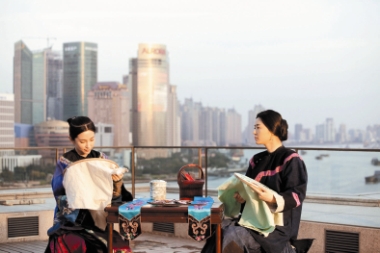 Starring: Li Bingbing, Jeon Ji-hyun, Archie Kao, Hugh Jackman Director: Wayne Wang Cao Zhen IF “Snow Flower and the Secret Fan” didn’t feature Hugh Jackman in a guest appearance, if the movie were not backed by Wendi Murdoch and if it weren’t a Sino-U.S. co-production nor screened in the United States, only a few young Chinese would be interested in watching the historical movie about female friendship. The movie first caused a stir in China two years ago, when some domestic media promoted it as a lesbian flick. Of course, there are no lesbian scenes allowed on mainland screens. In order to cater to both Easterners and Westerners, the movie’s characters, played by A-list stars, engage in abandoned and little-known Chinese customs. Adapted from Chinese-American Lisa See’s novel of the same name, the movie is partly set in the 19th century China, when women were illiterate, not expected to think and only loyal to their husbands. But in a Hunan village, women developed their own secret code — nushu (women’s writing) — to communicate between laotong pairs (sworn sisters). Marriage was arranged by parents but choosing a laotong was one’s own choice. Lily (Li Bingbing) comes from an average family but she has a pair of beautiful small feet after experiencing the painful process of foot-binding, an old custom in China. She and Snow Flower (Jeon Ji-hyun), who comes from a wealthy family, are committed to being laotong for eternity. Before getting married, they can meet and share a bed. But after marriage, finding chances to meet becomes difficult. So they write nushu on fans to communicate and chronicle their lives. Their lives later take different paths. Thanks to Lily’s enticing small feet, she marries into a wealthy family, but Snow Flower’s family collapses due to her father’s addiction to opium. She marries a butcher and has a miserable life filled with beatings by her husband (Jeon dumps her brutal behavior in “My Sassy Girl” and gives a tear-jerking performance in the oppressed role). When Lily asks Snow Flower to leave the butcher and live with her, Snow Flower refuses, saying: “I love my husband. Now you have an abundant life; are you showing mercy to me?” Believing that Snow Flower has not been true to her and with her inability to forgive what she considers to be acts of betrayal, Lily stops seeing her. Unlike the novel, which begins when Lily is old and flashes back to the account of her life from her description, the movie begins with another story set in modern Shanghai. Lily’s story is told through a novel draft written by a South Korean migrant in Shanghai — Sophia. Chinese white-collar Nina (Li) and Sophia (Jeon) have an intense friendship from their school days onwards. But when they grow up, Nina is not happy with Sophia’s loose lifestyle, one of unemployment and a romance with a dandy Australian club-owner (Hugh Jackman). After a quarrel between the modern sworn sisters, Sophia disappears from Nina’s life and writes a novel — “Snow Flower and the Secret Fan.” If director Wang didn’t add the Shanghai story, the movie would be a triumph for its fascinating portrait of a long lost culture and the inner realm of oppressed women. But Wang deliberately makes an analogy between the modern sworn sisters and the miserable pair of old-time laotong, which turns out to clutter the plot. For example, Nina writes Sophia’s name on her own exam papers because Nina wants the absent Sophia to pass. Sophia tells Nina at the end of the movie that in order to let Nina leave her and live a new life in the United States, Sophia tries her best to make Nina hate her. Such naive scenarios damage the poetic but sad original Lily and Snow Flower’s story. China, a country with a long and eventful history, has a wealth of old customs and fables for moviemakers. Remember “Raise the Red Lanterns” (1991). The acclaimed movie about oppressed women takes viewers to a place at once distant and familiar — distant because of its time and setting, familiar because all of us can relate to its love and sorrow. But “Snow Flower and the Secret Fan” fails. The movie is now being screened in Shenzhen. | 
